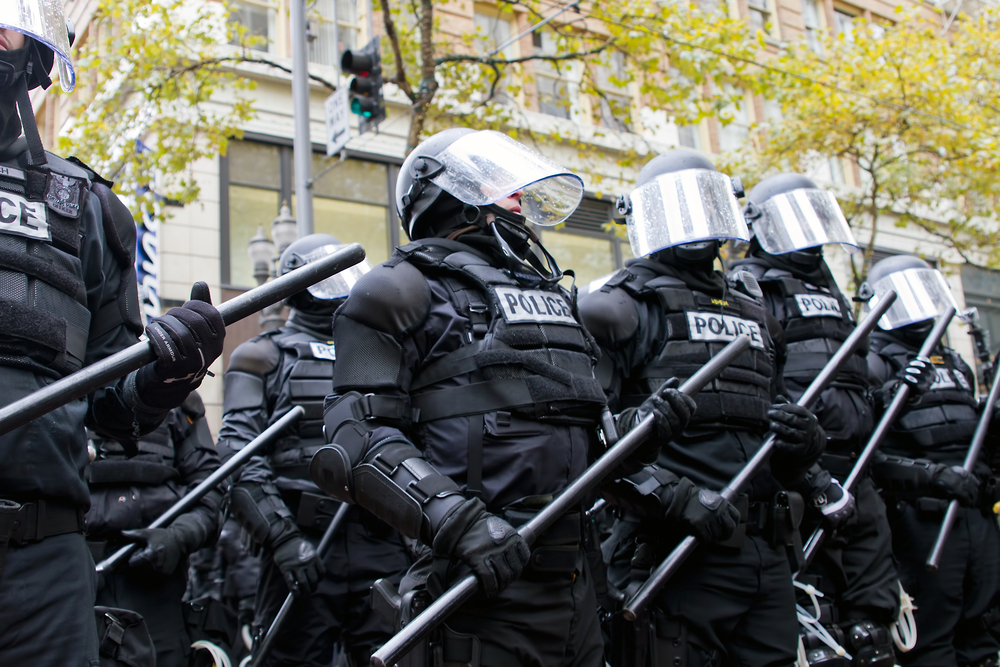Under Discussion: Law and Order as Suppression and Oppression

This piece is part of an Under Discussion series. To read more about this week’s topic and see more pieces from this series visit Under Discussion: Law and Order.
In the last four months, there have been protests every day in support of the Black Lives Matter movement. Despite an estimated 93% of these protests being peaceful, there have been continual calls for “law and order.” Trump tweeted as much and emphasized the need for it during his speech in response to recent protests in Kenosha, and now both he and presidential candidate Joe Biden have campaign ads promoting law and order.
When leaders focus on public safety during nationwide protests, this shifts the attention from the cause, motivation, and aim of the protests. For instance, consider a case in Kenosha, WI. Protests began after police shot Jacob Blake seven times in the back. Blake was an unarmed Black man returning to his family in his car. 17-year-old Kyle Rittenhouse travelled to Kenosha, allegedly to protect local businesses from the protesters and ended up killing two men.
But the Kenosha Sheriff, who was called to apologize for a racist rant in 2018, emphasized that the shootings would not have happened if Kenosha’s 7pm curfew had been respected. His words shifted attention from the shooter to the policies in place to ensure public safety. This spreads the blame for the murder of the protestors to include the victims as well as Rittenhouse, who had arrived from out of state with an AR-15-style rifle. (The ACLU is calling for the sheriff to be fired.)
When “law and order” is the story, the fact that “law” has never been meted out in any sort of even-handed fashion isn’t the story. When there have been months of Black Lives Matter protests, and the response is to call for “law and order,” this should give pause. The structure of law is saturated with practices that guarantee that its protections and penalties will not ensure the safety or dignity of Black members of our country. At every stage of its production and execution, “law and order” is something worth working to change.
Representatives making the law in Congress are disproportionately white. (Though the 116th congress is the most racially and ethnically diverse congress ever, it is only 22% non-white; 39.9% of people in the US are non-white according to the last census.) Further, voting for the representatives who make the law is easier, and designed to be easier, for white people. (After a 2013 Supreme Court decision struck down the Voting Rights Act, over half of the states have added policies that make it more difficult to vote, disproportionately affecting non-white voters. In the end, the system of law-making is bent towards white interests and white voices. And the justice system reflects this as well, both in the first contact it can make with individuals (the police), and the disparate consequences of this contact. Over-policing leads to the disproportionate arrests of Black and Latinx people living in the US. The use of forensic evidence that isn’t scientifically valid and biased for the prosecution, added to the practice of peremptory exemptions stack the deck against defendants in trials. When previously incarcerated people can’t vote, and incarcerated people are disproportionately Black due to these and other systemic problems, there are deep issues with the structure order of law.
But this summer, what are the protests around the country protesting? Not necessarily these legal institutions directly. Rather, the pattern of violence and brutality aimed at Black men and women by the police that has gone unchecked, that has only grown more and more blatantly obvious. The policies and practices of the police force have meant that the patterns of violence have continued. Ahmaud Arbery, George Floyd, Breonna Taylor, Elijah McClain, Jacob Blake, Daniel Prude, Mychael Johnson, Tony McDade and Wilbon Woodard are just some of the Black people murdered by police officers in 2020.
Appealing to “order” in the face of institutionalized oppression and a lack of indication that law or order will address the violence and lack of accountability is disingenuous, negligent, or hateful. The “order” that the leaders call for characterizes the protests as problematically “disorderly” instead of focusing on the cause for the protests disrupting the order. When paired with the value of “law,” these appeals ignore the failure of the legal system to serve rather than suppress members of our community.
This context might be different if the calls to law and order were redirected to law enforcement. The human rights violations during the protests brought the racism in the United states to the attention of the UN Human Rights Convention. Laws protecting the rights of journalists and medics were blatantly ignored, as police targeted them with the same tear gas and rubber bullets they assaulted other peaceful protesters with. Just in the time between May 26th and June 5th, Amnesty International documented 125 examples of police violence against protesters. The organization also found that the protesters’ human rights were repeatedly violated and documented acts of excessive force by police and law enforcement.
Ultimately, calls for “law and order” fail to acknowledge the grave injustices that got us here in the first place: the enforcers of law and order acting as tools of racism and violence. The response to the protests only highlights the need for the protests in the first place.




